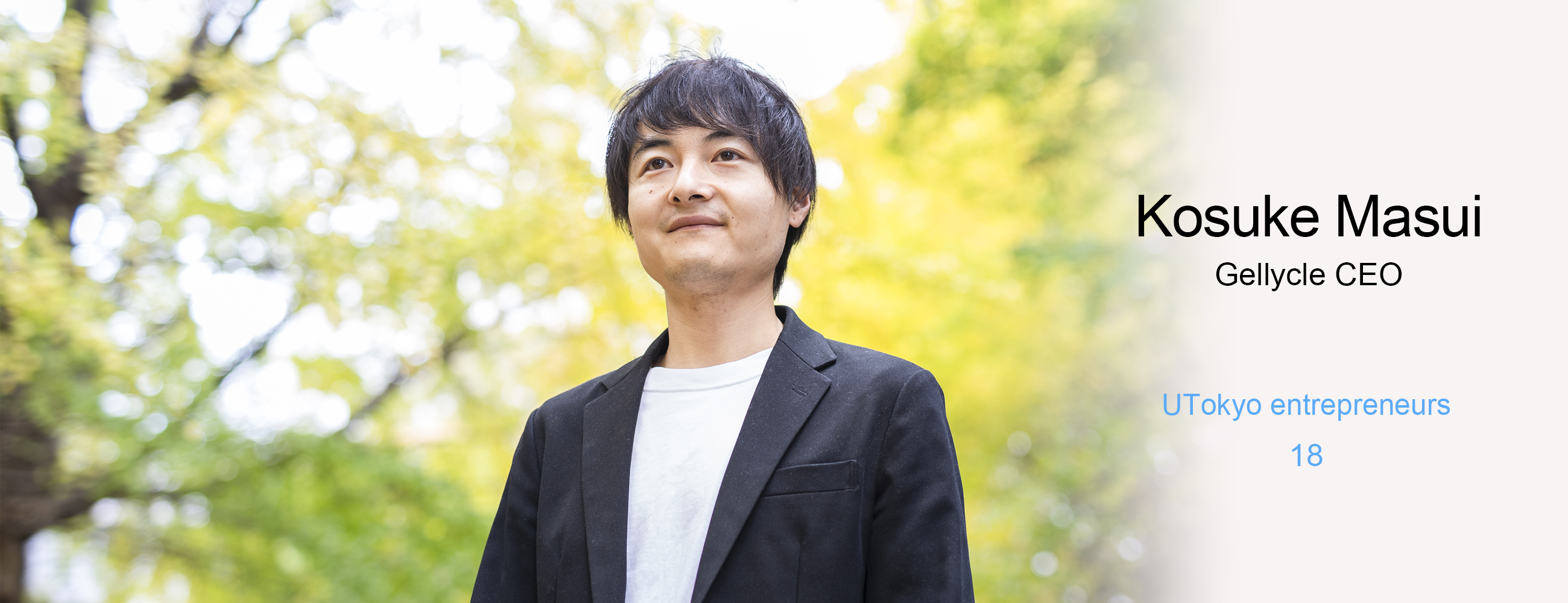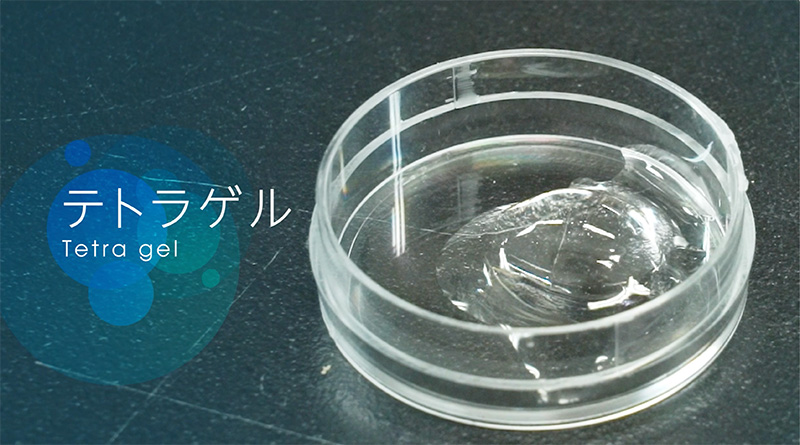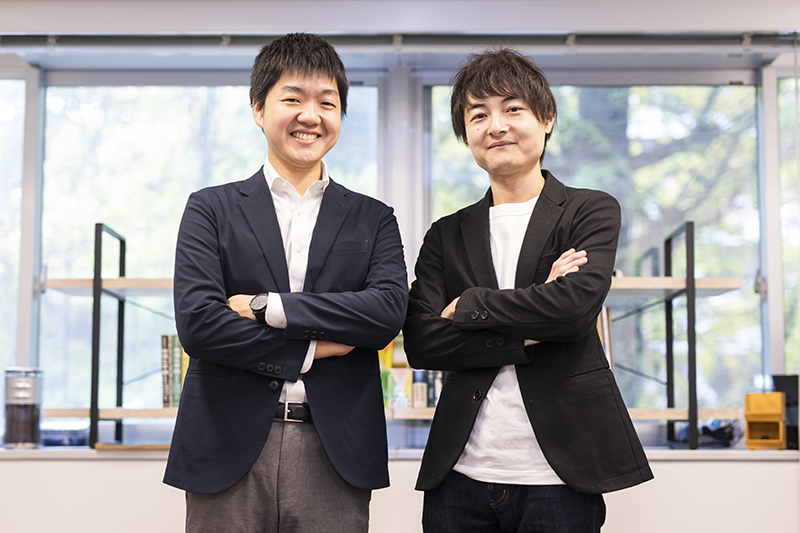Startup gets set to inject novel gel into medical field Entrepreneurs 18

This series introduces entrepreneurs who have received startup support from UTokyo programs or who have utilized university research. UTokyo’s support aims to expand Japan’s innovation ecosystem.

Kosuke Masui says he wouldn't be where he is now if it weren’t for the bumpy career path — at least by Japanese standards — which landed him in three jobs, in succession, in just six years. The last one was at a startup that he co-founded, which ended when he was ousted from the company.
Masui is now CEO of Tokyo-based startup Gellycle Co., Ltd., which offers a state-of-the-art gel that is safe inside the body and suited for various medical applications. Since its founding in 2018, Gellycle has worked with pharmaceutical companies and conducted joint research with doctors at the University of Tokyo Hospital. The company’s aim is to commercialize Tetra-gel, the first-ever gel whose physical properties are understood scientifically and can be controlled with precision. With its rich water content making it highly biocompatible, this gel developed by the University of Tokyo is seen to hold great promise for the field of regenerative medicine.
“I managed to achieve what I have because of the ups and downs I experienced in my career that forced me to start from scratch multiple times,” Masui said. During those turbulent years, his goal remained the same: to deliver practical applications of research in his business endeavors. Such determination helped him ride out the various storms he encountered.
Gellycle seeks to ensure growth by limiting the size of its staff and not relying on funding from venture capital firms and other outside sources. With government approval of Tetra-gel now in sight, Gellycle is planning to enter the global market, with particular emphasis on the European market.
A bumpy career path
After graduating from Kanazawa University’s School of Pharmacy, Masui entered the University of Tokyo’s Department of Bioengineering in 2008. He said it’s unusual for students to switch from pharmacy to engineering. Masui explained: “I needed to gain knowledge in an advanced engineering field to achieve my goal of making research results available to society, instead of conducting basic research.”
Masui eventually chose the lab of Professor Takamasa Sakai, who would become a co-founder of Gellycle. Sakai, who had just developed Tetra-gel, was conducting basic research on the gel.
After completing his master’s program in 2011, Masui found a job but quit after just one year. He was then hired by an information technology company, where he rose to the No. 2 spot in the corporate hierarchy in four and a half years after successfully developing a business strategy and launching new projects. He then left the firm and co-founded an IT startup with an acquaintance, but was ousted after less than a year when their relationship soured. Masui was devastated and over the next 18 months he traveled to about 40 countries as he contemplated what he wanted to do with his life.
During his travels, Masui began to develop a desire to start a business, not in the IT sector, but in the area of deep tech, which offers solutions based on scientific discoveries and engineering innovation.
Realizing that universities have many deep tech resources and lots of know-how, Masui contacted Sakai as soon as he returned from his global tour. It turned out that Sakai was looking for someone to help him commercialize Tetra-gel.
“Frankly speaking, I initially had no interest in making the gel my business,” Masui said. “But after many discussions with Professor Sakai, I came to believe only I could deliver Tetra-gel to society.” In 2018, Masui and Sakai established Gellycle.
Learning doctors’ needs through the UTokyo medical network

Conventional gels have nonuniform, heterogeneous structures and their physical properties have been difficult to pin down. This has hindered their application in the medical field. But the physical properties of Tetra-gel, which is made by mixing two different kinds of polymers that bind together to form a uniform, meshlike structure, are fully understood. This means Tetra-gel ’s specifications, such as the timing of its solidification and its stiffness, can be controlled and adjusted freely.
Gellycle has teamed up with Medico’s Hirata Inc., an Osaka-based medical device company, to develop a hemostatic agent using Tetra-gel to stop bleeding. They aim to win government approval for the product in 2025. Gellycle has also sealed an agreement with Kaigen Pharma Co., Ltd., also in Osaka, in which the pharmaceutical company will have exclusive negotiation rights with Gellycle for applications of Tetra-gel in certain medical fields.
“It is important to fully understand the needs of medical professionals in order to improve patients’ quality of life,” said Masui, explaining why he has interviewed UTokyo Hospital doctors and conducted joint research projects with them. About 20 doctors have now joined Gellycle as advisers. Masui said Gellycle was able to connect with this network of doctors thanks to Professor Yuichi Tei (Ung-il Chung) of UTokyo’s Graduate School of Engineering and Graduate School of Medicine, who co-heads the lab with Sakai. Because of Tei’s connections, commercial applications of Tetra-gel have centered on the medical field.
Tetra-gel applications under development include an anti-adhesion agent, medical devices to treat varicose veins and aortic dissection, and a device that prevents cartilage abrasion by injecting the gel into the knee. The startup also wants to see Tetra-gel used in the field of regenerative medicine, which presents daunting challenges.
Going it alone to reach the global market
What makes Gellycle different from many other biotechnology startups is that it operates without funds from outside sources or subsidies. Developing products requires a lot of money. “The scale of funding in Japan could be one-tenth, or in some cases one-hundredth, that of the United States,” Masui said. “In such an unfavorable business environment, even if you take your company public, you can hit a wall financially before your product reaches the market. So it is imperative to start small.”
In fact, Gellycle has only three members: Masui, Sakai and Chief Technology Officer Hiroyuki Kamata, who joined Sakai’s lab after Masui left. Kamata joined the startup in 2020 after working at a corporate research institute because he wanted to try something new where he could apply his expertise.
Masui recently visited Germany to introduce Tetra-gel as part of the company’s effort to enter the global market. “I was able to show companies there that our gel is unique,” Masui said. “I’d like to focus on global sales promotion.” Gellycle plans to hire a staff member fluent in English this year as it prepares to roll out its global strategy.

Gellycle Co., Ltd.
Established in August 2018 by CEO Kosuke Masui and his supervisor at UTokyo’s Graduate School of Engineering, Professor Takamasa Sakai. To use Sakai’s gel technology, the company received support for patent licensing from TODAI TLO, Ltd., which serves as a bridge between UTokyo’s inventions and companies. It has also received incubation support from UTokyo Innovation Platform Co., Ltd., with which Masui still consults when he has problems. The startup has also received other forms of hands-on support from UTokyo’s incubation ecosystem, including the Division of University Corporate Relations, which has introduced many companies to Gellycle. The startup has a policy of making steady progress without seeking outside funds, with the mission of ensuring better quality of life for patients. It also plans to explore opportunities in various industrial fields. (Pictured are Gellycle CEO Kosuke Masui, right, and Chief Technology Officer Hiroyuki Kamata.)
Date of interview: Nov. 21, 2022
Interview/Text: Yumiko Mori
Top and bottom photos: Kohei Hara






